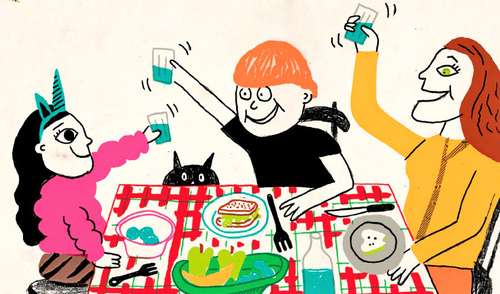The series of children’s books Sopa de Ciencias, published by the Argentine publishing house Iamiqué, seeks to investigate how we relate this area of knowledge in our lives, from explaining why we cry when cutting onions to how video games work.
In interview with The Day, The editor Carla Barendes (Buenos Aires, 1964) pointed out that the collection began with Chemistry even in the soup (2014), in which Silvana, a graduate in chemistry, shows her sister Marina that this science surrounds us in everyday space.
The also author of That’s not my tail (2003), commented: “since they liked that book a lot, we began to call for disseminators and it emerged Ecology even in the soup, Mathematics even in the soup, Physics even in the soup y Biology even in the soup. Each one is written by doctors in their field; The author chooses who he will spend the day with to explain about his field of study, most select children and think about the activities they will do.
In physics they go to a park; in mathematics, to buy groceries. With ice cream you think about volume; They wonder, is a liter the same as a kilo? Why is it sold that way?
she explained happily.
Baredes’ work consists of build bridges with scientists; When we receive their texts it is quite difficult, since many are researchers and have certain resistances, they worry more about what their peers think. The first thing I’ll clarify is that we are making a book in order to explain science to children and we want it to look good, not for anyone to open it or not understand it; It is not to study, but to read
.
Ediciones Iamiqué was founded in 2000 in Buenos Aires, Argentina, by the biologist Ileana Lotersztain (1972) and the physicist Barendes, who says that they met when they were young specializing in scientific dissemination and worked together in educational institutions, but they felt that “they did not They addressed interesting or fun topics, so we kept questions that we liked and one day we started making proposals to an Argentine newspaper, in which we published eight small science books.
“Due to financing issues, we looked for an opportunity that never came, so we opted to make a book and a publishing house on our own. They told us it was crazy, a failure; So we ask ourselves: ‘or do we give up or say what?’, as kids say when they feel that all the evils are going to come if they don’t do something correctly. We found that nice, a challenge, like saying that I am not willing to tolerate misfortunes, so we named her Iamiqué,” he says with a smile.
The teacher also commented that both are very enthusiastic about sharing their knowledge, more when they adjust to our reality. We are interested in explaining what happens around us, not only what happens in a laboratory, but also telling things like natural disasters, about our pets, when we have lice or when we eat. We started by making a book, it went very well, because a person quickly got in touch to send material to the libraries and, thus, the first edition was sold out in a few months. We started working at the publishing house in our free time and after four years we dedicated ourselves completely to it, now in a more structured way and in an office
.
Let’s find out
He added: “we decided to work with children, because adults develop a lot of prejudice towards science, there is something that goes off in adolescence and school contributes to that. It is surprising how lightly adults say that they do not understand anything, as if it were not a problem, it seems that there is something that is forbidden to people who are not dedicated to a topic, as if science, knowledge and culture science were reserved for very specialized fields. That doesn’t happen with children, they are capable of asking everything. We try to ensure that that curiosity does not go away and that as adults they can say: ‘I have no idea, but let’s find out.’”
Barendes added that they have also been encouraged to work with the social sciences. In the exact ones, “in science the truths seem indisputable until a theory appears that can explain it better and that changes, meanwhile we feel sure of what we know; This does not happen in the social sciences. We also enter the history of technology to make room for the creators, the people who researched and were after an idea for a long time. We continue with philosophy, in which there are many answers to the same question.
We embark on topics that motivate us with the help of authors and illustrators; It is a period of a lot of creativity and, at the same time, a lot of exploration in relation to knowledge because there are various aspects that arise, we have an idea and a route, but along the way we are always changing. The book represents a lot of teamwork and respect for the readers, we verify the information, if there is something that is difficult to explain we can spend days thinking about it to also make what is read understandable.
he concluded.
The five books in the Science Soup series are available in the El Naranjo online store and on Amazon.
